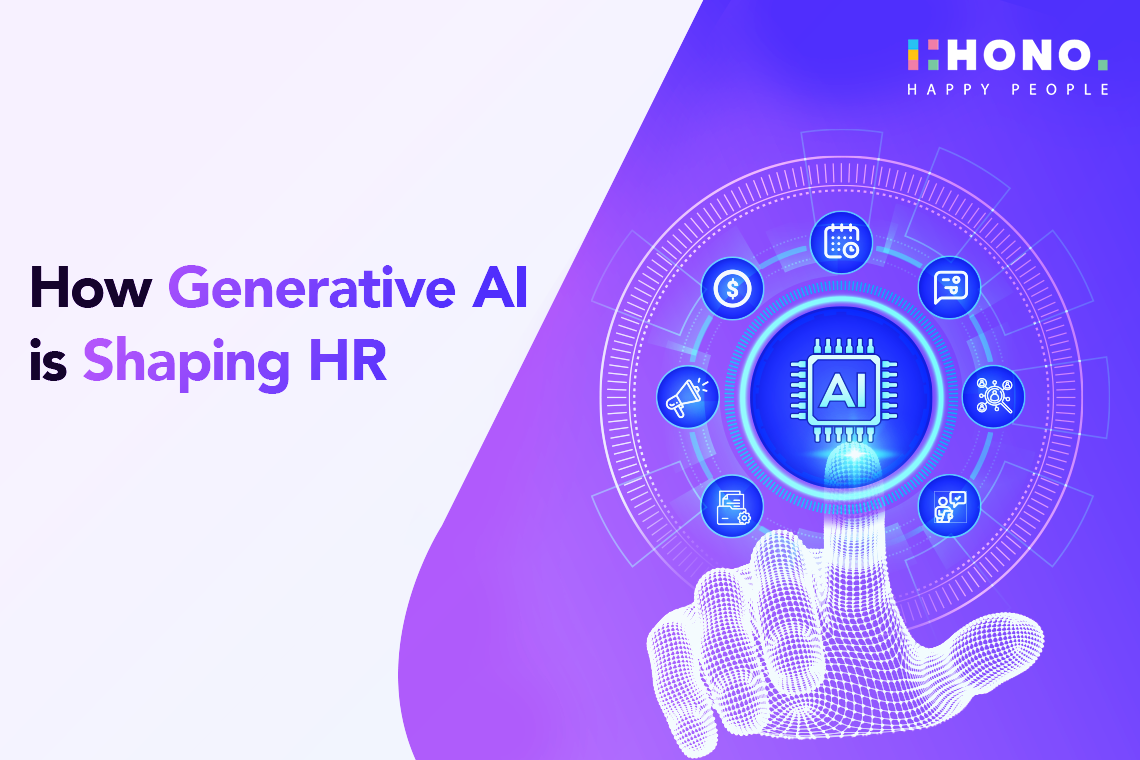According to studies of AI in Recruiting, 40% of a recruiter's time is spent just reviewing applications and entering relevant data into an applicant tracking system (ATS).
Impact of AI on Talent Management: Streamlining Recruitment Processes
9 mins

The talent management landscape has shifted since the introduction of AI. It has had a major effect on the way people are hired. In addition to being able to process massive amounts of data quickly, this technology can perform repeated tasks in less time.
Chatbots, virtual assistants, and applicant tracking systems are the most common forms of AI utilised in the hiring process. These programmes can use keywords to sift through applications and weed out those who aren't a suitable fit for the position.
Using an AI tool to do mundane administrative work like reviewing resumes and setting up interviews can be quite efficient. Because of big data and the availability of more information than ever before, AI-based algorithms can learn from their past interactions with job applicants and improve their performance with each new encounter.
Also Read: How to Choose the Right HR Automation Solution for Your Company?
How can AI be used in talent acquisition?
Here are 5 areas in which AI can benefit the talent management process.
-
Job descriptions
Recruiters, especially novice recruiters or recruiters for highly technical positions, cannot be expected to grasp everything about the intricate details of the job post. What keywords in a certain field get the most appropriate responses? Which terms unintentionally convey gender preference? This is where artificial intelligence comes into play. For several years, competitive talent acquisition products have used intelligence to assess linguistic options and recommend alternatives.
For example, if a recruiter is drafting a job description for a welder and all of the welders in their previous experience were male, the language may be unintentionally biased towards male applicants. The AI engine should not be biased in the same way. As in other circumstances, a human eye should be applied to the results since if the AI data set only contains male welders, the engine may incorrectly conclude that other male attributes are required to be a successful welder based on features that tend to surround welding expertise.
-
Candidate sourcing
Starting with how the job requirements are written, the AI engine can search for more than just the exact words in the job posting. It can also look for similar industry-specific words and phrases. AI-enabled sourcing is different from a simple word-matching algorithm because it lets you look by intent or meaning.
AI in talent acquisition also deal with the idea of skills that go well together through their deep learning. Based on a study of millions of data points, if a candidate knows how to do something, the software can figure out the prerequisites for that skill or knowledge and figure out how likely it is that the person has a similar but different skill.
Sourcing candidates is made easier because there is a bigger, more diverse group of candidates that HR might miss during the talent management process. Over time, this can help answer questions like:
- What are the best places to find people who will do well on the job and stay for more than two years?
- Where can you find the most women who have risen to management positions?
- What tools are you using to find health care workers who can start on the first day?
AI can find candidates or evaluate them later by figuring out what skills or interests they have based on things like previous jobs, volunteer work, or schooling. Since the programme is always learning, it keeps track of connections that it can then use in different employment situations. This can make it possible for a candidate or present employee to be a good fit for more jobs within an organization, even if they didn't apply for them.
-
Applicant screening
Candidate screening process can be amplified using machine learning programmes that can be trained on a wide variety of data, such as historical and current resumes, competency and skill models tailored to the job at hand, incoming resumes, and records of employee success or longevity according to skills, education, and even location.
-
Skill assessment
To give data-driven insights regarding talents, AI-powered recruitment software employs a deep neural network that analyses billions of profiles, and more than a million distinct skills. AI assists businesses in determining the global distribution of capabilities in order to locate talent in certain regions, with the ultimate objective of comprehending an applicant's potential.
Validated skills, likely adjacent skills, yet-to-be-validated skills, and missing skills are all evaluated by the AI-driven software. When it comes to reskilling, it's crucial that AI is able to spot skill shortages in the workforce and recruit the most qualified candidates to fill them.
-
Onboarding
The day an employee receives a job offer is the day they are most excited about starting work. A drop in enthusiasm is possible after accepting a job offer but before starting work. AI and bot-initiated conversation play a significant role in this area as well. To begin, AI "knows" what paperwork is required for which positions in which places, so it can hand along the right paperwork to the new recruit.
Due to the convenience of digital signatures, all of this may be taken care of before the first day of work. AI may also determine if the forms are full and proper by detecting discrepancies in replies such as age, Social Security number, addresses, and so on and automatically demanding data verification or reenter.
Also Read: Employee Onboarding Software: Top 8 Factors to Help You Choose The Right Option
How AI helps in recruitment?
-
Enhanced Quality of Hiring
Leveraging AI in talent acquisition has a number of major benefits, one of the most important being improved recruiting quality. Candidates will be matched up in the system with particular needs that are associated with positions. This implies that individuals are swiftly filtered out from consideration if it is determined that they do not satisfy all of the requirements for a post, such as qualifications, abilities, experience, and so on.
-
Improved Analytics Integration
Integrating AI into the hiring process or AI-powered hiring process primarily serves to speed up the procedure. This is when analytics comes in handy. Analytics allows you to track the efficiency and duration of your hiring procedure.
You can also find out the reasons applicants are being passed over for further consideration. You may use this data to refine your hiring practises, which is invaluable.
You can discover where your recruiting process is broken by analysing your stats. Using analytics, you can also see what steps in the hiring process take the longest.
If one aspect of your process takes longer than another, you should take appropriate action to enhance the process of recruitment. This will make the recruiting process more efficient and save you time and money in the long run.
-
Complete Recruitment Automation
It's no secret that artificial intelligence (AI) is transforming the recruiting and HR game. Many facets of the recruiting process employ technology, from selecting the top candidates to arranging interviews to making job offers.
AI is utilised for everything in this new strategy, from posting positions to delivering feedback after interviews.
This level of recruitment automation has various advantages. For starters, it frees up recruiters' time to focus on duties that need human connection, such as creating relationships with applicants, ensuring workers are pleased in their new responsibilities, and discovering innovative ways to improve the corporate culture.
Second, it may assist guarantee that your recruiting decisions are not biassed. Parts of the recruitment process that are automated will reveal any biases built into your system, allowing you to rectify them before they become an issue.
Finally, artificial intelligence-powered recruitment automation may assist you in attracting more qualified workers by optimising how you advertise positions and search for possible hires based on previous searches.
-
Unconscious Bias Elimination
One big advantage of employing AI in recruitment is that it reduces human mistake. Most businesses do not have flawless recruiting records; some managers may make mistakes when deciding who gets recruited for a position due to personal prejudices or a lack of knowledge about specific candidates.
When top talent slips through a company's hold because of bad decisions made during interviews and other selection processes, these mistakes can cost millions of dollars.
With AI, all judgements are made objectively, with no room for human mistake, resulting in lower turnover rates among new recruits and happier employees overall.
Also Read: Transforming Employee Experience with AI
-
Time-saving and Efficiency
AI-based recruiting solutions are rapidly being employed by enterprises, especially to minimise the total time of the hiring process.
According to statistics, talent acquisition professionals often spend roughly 13 hours (or one-third of their expected weekly schedule) seeking applications for only one available post. This is merely the first step of a rather longer process.
As a result, recruiters have begun to choose AI-powered hiring tools since it may expedite their talent acquisition process. The algorithms scan candidates based on particular criteria, assign interview dates, and even deliver assessment findings in a shorter amount of time.
The application of AI-powered hiring is fast expanding, continuing the trend. The emergence of AI in recruiting is being driven by various causes, including a need for speed, accuracy, and efficiency in the hiring process.
In addition to offering real-time feedback on candidates' strengths and flaws, AI may assist recruiters by tackling time-consuming low-value activities.
AI promises to assist recruiters in making more timely and informed selections regarding talent.
By automating low-value operations like screening CVs and organising interviews, AI frees up recruiters' time to focus on activities that need human engagement, such as interviewing applicants and forming connections with hiring managers.
As businesses begin to integrate AI technology, it is critical to assess how this new tool will affect your employment process.
Contact us to learn more!
Frequently Asked Questions
HCM software automates and streamlines HR processes, making them more efficient and accurate. It provides a centralized platform for managing employee data, tracking performance, facilitating talent acquisition, and improving employee engagement. By leveraging HR management software, organizations can save time, reduce administrative burdens, make data-driven decisions, and enhance overall HR operations.
AI-driven HONO is considered the best HR software due to its innovative use of Artificial Intelligence (AI) to streamline and enhance HR processes. Here’s why. It provides actionable, data-driven insights that enable HR professionals to make informed decisions, improving overall organizational effectiveness and strategic planning. HONO automates repetitive and time-consuming HR tasks, allowing HR personnel to focus on more strategic activities, thereby increasing overall productivity and efficiency. HONO is scalable and adaptable, catering to the evolving needs of organizations, regardless of their size or industry.
Choosing the right Employee Management Software involves considering several factors to ensure it meets the organization’s needs. Here’s a guide to help you choose. Clearly define what you need the HRMS software to achieve, considering aspects like attendance tracking, performance management, and employee development. Determine a budget considering both the initial cost and ongoing expenses like subscription fees, updates, and support. Ensure the HCM software integrates seamlessly with other systems and tools used in your organization, such as payroll and attendance systems. Opt for cloud HCM with an intuitive and user-friendly interface to ensure ease of use for both HR personnel and employees. Assess the human capital management solution's security features and its ability to comply with relevant laws and regulations to protect sensitive employee data. By considering the above factors and conducting thorough research, you can select an Employee Management Software that aligns with your organizational goals and enhances overall workforce management.
Hono
HONO is a Author








.jpg)
